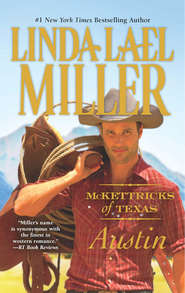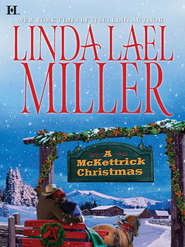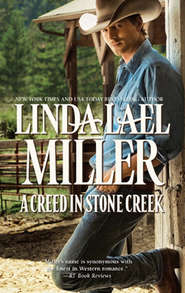По всем вопросам обращайтесь на: info@litportal.ru
(©) 2003-2024.
✖
McKettrick's Luck
Автор
Год написания книги
2019
Настройки чтения
Размер шрифта
Высота строк
Поля
“Look, the fishpond is certainly dispensable—”
Jesse crossed the room, jerked open the door. Sunlight rimmed his lean frame and broad, rancher’s shoulders. “You’re damned right it is!”
He stormed toward the house and once again Cheyenne had no choice but to follow after she tossed the blueprints into the car through an open window.
He left the back door slightly ajar, and Cheyenne squeezed through sideways, not wanting to push it all the way open. She was about to make a dash for the bathroom, switch the cowgirl gear for her normal garb and speed back to town, over the railroad tracks—home—when she caught herself.
Jesse stood facing the sink with his hands braced against the counter in much the same way he’d held the blueprints down out in the schoolhouse. Judging by the angle of his head, he was staring out the window.
“I didn’t do anything wrong,” Cheyenne said, more for her benefit than his own. “That creek can’t be all that important to the survival of this ranch or one of your ancestors would have grabbed it at the source a long time ago.”
He turned to face her, moving slowly, folding his arms and leaning back against the edge of the sink. “If I were you, I wouldn’t talk about grabbing land,” he said.
Cheyenne squinted at him, trying to decide if he was softening a bit or if the impression was pure wishful thinking on her part. “It’s enough to say no, Jesse,” she said quietly. “There’s no reason to be angry.”
Jesse shoved a hand through his hair, then flashed her a grin so sudden and so bright that it almost set her back on her heels. “I’m sorry,” he said. “I’m mad at myself, not you.”
Cheyenne stared at him, disbelieving, almost suspecting a trick. In her experience, anger was a shape-shifter, disguising itself as some gentler emotion only to rise up again when she least expected, and roar in her face like a demon from the fieriest pit of hell.
“I should have thought about that creek,” he went on as she stood frozen, like a rabbit caught out in the open by some crafty predator. “For a while there I was actually playing with the idea of making the deal. I started thinking about families, little kids on tricycles and dogs chasing Frisbees. It wasn’t until you showed me where the koi pond would be that I reined myself in.”
“What if we promised never to divert the creek, at any time, for any reason?”
Jesse sighed. “If you promised me that I’d probably believe it, but you can’t and you know it. Once the units are sold and your company moves on, anything could happen. The homeowner’s association could vote to dynamite the creek and make their own lake, and there wouldn’t be much I could do about it.”
Cheyenne pulled back a chair at the big kitchen table, which was not an antique as she would have expected, but an exquisite pine creation, intricately carved and inlaid with turquoise and bits of oxidized copper, and sank into it. She propped one elbow on the table top and cupped her chin in her palm. “There would be things you could do, though. McKettrickCo must have an army of lawyers on staff. You could get a court order and block anything like that indefinitely.”
“McKettrickCo’s lawyers,” Jesse said, opening the refrigerator and taking out a bottle of sparkling water and a beer, “are not at my beck and call. Even if they were, they’ve got plenty to do as it is.”
He set the water down in front of her, and she was impressed that he’d remembered her preference for it from the night before.
“This is the most beautiful table I’ve ever seen,” she said as she gave a nod of thanks and twisted off the top of the lid to take a much-needed sip.
Jesse hauled back another chair and sat down, opened his beer. “Handcrafted in Mexico,” he said. “My mother has an eye for what she calls ‘functional art.’”
Not to mention a bottomless bank account, Cheyenne thought. “Maybe we should use coasters,” she said practically.
Jesse laughed. “The wood is lacquered. It wouldn’t qualify as functional if you could leave rings on it with a beer can or a bottle of water.”
Cheyenne felt herself relaxing, which was strange given that she could almost hear everything she’d planned for and dreamed of creaking like the framework of an old roller coaster about to come crashing down around her ears. The dust wouldn’t settle for years.
“Why do you want that particular tract of land so badly?” Jesse asked, catching her off guard again. “It’s more than the job, isn’t it?”
Maybe, Cheyenne thought, she ought to go for the sympathy vote. She sighed, took another drink of water. Jesse had already made up his mind; at this point, she had nothing to lose.
“There’s a bonus in it,” she said. “The money would make a lot of difference to my family.”
Jesse shifted in his chair and turned his beer can around on the tabletop as he thought. “There must be a lot of other people out there, ready and even eager to sell their property. Why does it have to be my land?”
“Nigel wants it,” Cheyenne answered.
He raised one eyebrow. “Nigel?”
“My boss. And this is probably going to mean my job.”
“You could always get another job.”
“Easy to say when you’re somebody who doesn’t need one.”
Jesse hoisted his beer can slightly. “Touché,” he said. “There might be a place for you at McKettrickCo. I could ask Keegan.”
Cheyenne remembered Keegan from school. He’d been the serious, focused one. And Rance, who’d been almost as wild as Jesse. She might have gone for the sympathy vote in a last-ditch effort to pull the deal out of the soup, but accepting McKettrick charity was another thing. “I’ll be all right,” she said. Good thing she didn’t have to say how that was going to happen, because she had no earthly idea. She smiled. “Is the Roadhouse hiring? I might be able to get on as a waitress. Or maybe I could deal cards in the back room at Lucky’s—”
He reached out unexpectedly and squeezed her hand. “You’re smart, Cheyenne. You always were. You have experience and a degree, unless I’ve missed my guess. There are a lot of options out there.”
“Not in Indian Rock, there aren’t,” she said. “And for right now, anyway, I’m stuck here.”
Jesse circled the center of her palm with the pad of one thumb, and a delicious shiver went through Cheyenne. “I can’t say I mind the idea of your hanging around for a while,” he told her. “And Flag’s just up the road. Probably lots of work there, for somebody with your skills.”
Cheyenne bit down on her lower lip. “Sure,” she said, with an attempt at humor. “There must be at least one company looking to drive wildlife out of its natural habitat and decimate the tree population. Why was I worried?”
Maybe, answered her practical side, because she’d sold her car and sublet her apartment. Once Nigel pulled the company credit cards and she’d turned in the rental, she’d either have to drive her mother’s van or hope her old bike was still stashed in the garage behind the house.
“You must have done well, Cheyenne. Why are you in such a pinch?”
“What makes you think I’m in a pinch?” How the hell do you know these things? Are you some kind of cowboy psychic?
“I can see it in your eyes. Come on. What’s the deal? Maybe I can help.”
She bristled at that. “If you want to help, Jesse, sell me the land. I’m not soliciting donations here. I’m offering you the kind of money most people couldn’t even dream of laying their hands on.”
“Take it easy,” Jesse counseled. “I didn’t mean to step on your pride. We went to school together, and that makes us old friends. I just want to know what’s going on.”
She would not cry. “Medical bills,” she said.
“From your brother’s accident.”
“Yes.”
“Wasn’t there insurance?”
“No. My mother worked as a waitress.” She isn’t a socialite, ordering tables inlaid with turquoise. “My stepfather was a day laborer when he worked at all, which wasn’t often. He was more interested in trying to get some kind of disability check out of the government so he could play pool all day. In fact, if he’d worked half as hard at a real job as he did at getting on the dole, he might have accomplished something.”
“So it all fell on you? You weren’t legally responsible, Cheyenne. Why take on something like that?”
“Mitch is my brother,” she said. For her, that was reason enough. The hospitals and doctors had written off a lot of the initial costs, and Mitch received a stipend from Social Security. At nineteen, he was on Medicare. But the gap between the things they wouldn’t pay for and the things he needed was wide. “He can survive on his benefits. I want him to do more than survive—I want him to have a life.”
“Enough to sacrifice your own?”











